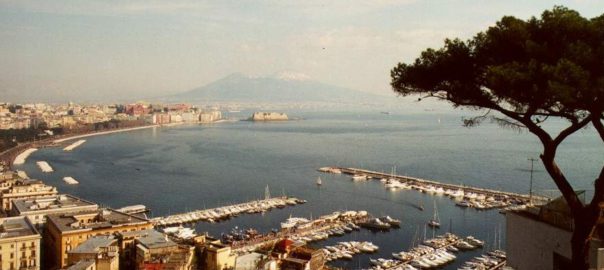| Original Napuletano | My translation (in verse) |
Ogn’anno, il due novembre, c’è l’usanza
per i defunti andare al Cimitero.
Ognuno ll’adda fa’ chesta crianza;
ognuno adda tené chistu penziero. | Each year, on November 2nd,
it is usually customary,
for each of us who has lost someone,
To visit the cemetery. |
Ogn’anno, puntualmente, in questo giorno,
di questa triste e mesta ricorrenza,
anch’io ci vado, e con dei fiori adorno
il loculo marmoreo ‘e zi’ Vicenza. | Every year and without fail,
on this sad and gloomy day,
I go there too, flowers in-hand
for Aunt Vincenza’s grave. |
St’anno m’è capitata ‘n’avventura…
dopo di aver compiuto il triste omaggio
(Madonna!), si ce penzo, che paura!
ma po’ facette un’anema ‘e curaggio. | This year was different for
after having completed this sad homage,
(Mother of God!) To think of it,
I nearly lost my courage. |
‘O fatto è chisto, statemi a sentire:
s’avvicenava ll’ora d”a chiusura:
io, tomo tomo, stavo per uscire
buttando un occhio a qualche sepoltura. | This is what happened, so listen up!
For it was quite the scare:
At closing time, I wandered by,
looking at graves here and there. |
«QUI DORME IN PACE IL NOBILE MARCHESE
SIGNORE DI ROVIGO E DI BELLUNO
ARDIMENTOSO EROE DI MILLE IMPRESE
MORTO L’11 MAGGIO DEL ’31». | One read: “HERE RESTS THE NOBLE MARQUIS
LORD OF ROVIGO AND OF BELLUN’
HERO OF A THOUSAND DEEDS
DEAD MAY 11th 1931″ |
‘O stemma cu ‘a curona ‘ncoppa a tutto…
…sotto ‘na croce fatta ‘e lampadine;
tre mazze ‘e rose cu ‘na lista ‘e lutto:
cannele, cannelotte e sei lumine. | The coat of arms with a crown on top
Below a cross of lights imposes,
Six candles and a votive lamp
Among a bunch of roses. |
Proprio azzeccata ‘a tomba ‘e stu signore
nce steva n’ata tomba piccerella,
abbandunata, senza manco un fiore;
pe’ segno, sulamente ‘na crucella. | Next to the tomb of this noble man
stood another grave, very small,
Forlorn, with not a flower on it,
Just a cross… and that was all. |
E ncoppa ‘a croce appena se liggeva:
«ESPOSITO GENNARO NETTURBINO»
Guardannola, che ppena me faceva
stu muorto senza manco nu lumino! | Atop the cross it was hard to see
The script was faint and wan,
And as I read it I was saddened:
“HERE LIES GENNARO, THE GARBAGE MAN” |
Questa è la vita! ‘Ncapo a me penzavo…
chi ha avuto tanto e chi nun ave niente!
Stu povero maronna s’aspettava
ca pure all’atu munno era pezzente? | Such is life! I told myself
He had nothing when he died.
Did this poor man ever expect,
to be a wretch on the other side? |
Mentre fantasticavo stu penziero,
s’era ggià fatta quase mezanotte,
e i’ rummanette ‘nchiuso priggiuniero,
muorto ‘e paura… nnanze ‘e cannelotte. | And as I thought, midnight chimed,
And closing time arrived.
Scared to death I found the gate
was locked with me inside! |
Tutto a ‘nu tratto, che veco ‘a luntano?
Ddoje ombre avvicenarse ‘a parte mia…
Penzaje: stu fatto a me mme pare strano…
Stongo scetato… dormo, o è fantasia? | Suddenly what do I notice?
Two shadows coming towards me.
Am I awake? Or am I asleep?
Or is this all just fantasy? |
Ate che fantasia; era ‘o Marchese:
c”o tubbo, ‘a caramella e c”o pastrano;
chill’ato appriesso a isso un brutto arnese:
tutto fetente e cu ‘na scopa mmano. | No dream! It was the Marquis there
With top hat, coat – all grand –
And behind him was a nasty figure
Stinking, with broom in hand. |
E chillo certamente è don Gennaro..
‘o muorto puveriello… ‘o scupatore.
‘Int’ a stu fatto i’ nun ce veco chiaro:
so’ muorte e se retireno a chest’ora? | That was, for sure, Gennaro
The garbage man looking dour.
But wait, they’re dead!
Why are they here? Walking at this hour? |
| Bah… | Oh well… |
Putevano stà ‘a me quase ‘nu palmo,
quando ‘o Marchese se fermaje ‘e botto,
s’avota e, tomo tomo… calmo calmo,
dicette a don Gennaro: «Giovanotto! | They were perhaps a breath away,
The Marquis then quickly stopped.
He turned sharply to Gennaro and
“Young man!” he sternly yalped. |
Da voi vorrei saper, vile carogna,
con quale ardire e come avete osato
di farvi seppellir, per mia vergogna,
accanto a me che sono un blasonato?! | “I’d like to know, you filthy wretch,
Why you have so dared,
To inter yourself right next to me
It’s shameful, you are aware? |
La casta è casta e va, sì, rispettata,
ma voi perdeste il senso e la misura;
la vostra salma andava, sì, inumata;
ma seppellita nella spazzatura! | Caste is caste, and noble blood
Commands respect that runs so deep.
Your body, on the other hand,
Should be in the garbage heap! |
Ancora oltre sopportar non posso
la vostra vicinanza puzzolente.
Fa d’uopo, quindi, che cerchiate un fosso
tra i vostri pari, tra la vostra gente». | No more can I tolerate
your stink or common face.
Therefore you should find a proper grave,
More suitable to your place.” |
«Signor Marchese, nun è colpa mia,
i’ nun v’avesse fatto chistu tuorto;
mia moglie è stata a ffa’ sta fessaria,
i’ che putevo fa’ si ero muorto? | “Mister Marquis, it was not my fault
to insult you like you’ve said.
It was my wife who did this deed,
what could I do since I was dead? |
Si fosse vivo ve farrie cuntento,
pigliasse ‘a casciulella cu ‘e qquatt’osse,
e proprio mo, obbj’… ‘nd’a stu mumento
mme ne trasesse dinto a n’ata fossa». | Were I alive, I’d gather up
The few bones that I could save.
And take them with me right away
And find another grave.” |
«E cosa aspetti, oh turpe malcreato,
che l’ira mia raggiunga l’eccedenza?
Se io non fossi stato un titolato
avrei già dato piglio alla violenza!» | “So why the wait? You filthy wretch,
Must my wrath overflow?
If I hadn’t been a titled man,
This would have come to blows!” |
«Famme vedé… – piglia sta violenza…
‘A verità, Marché’, mme so’ scucciato
‘e te sentì; e si perdo ‘a pacienza,
mme scordo ca so’ muorto e so’ mazzate!… | “What’s this now? Show me then!
The fact really is, Marquis,
If this is how you truly feel
You’ll be catching blows from me! |
Ma chi te cride d’essere… nu ddio?
Ccà dinto, ‘o vvuò capì, ca simmo eguale?…
… Muorto si’ tu e muorto so’ pur’io;
ognuno comme a ‘n’ato è tale e qquale». | What do you think? That you are God?
That really is deceitful.
Dead are you and dead I am,
And here we are but equals!” |
«Lurido porco!… Come ti permetti
paragonarti a me ch’ebbi natali
illustri, nobilissimi e perfetti,
da fare invidia a Principi Reali?». | “You filthy swine! How dare you doubt
that which my lineage evinces!
The blood that runs in my veins here
is that of royal princes!” |
«Tu qua’ Natale… Pasca e Ppifania!!!
T”o vvuo’ mettere ‘ncapo… ‘int”a cervella
che staje malato ancora ‘e fantasia?…
‘A morte ‘o ssaje ched’è?… è una livella. | “From princes flows this royal blood
This lineage in which you revel?
You are diseased with a delusion!
Do you know what death is? It’s a Level. |
‘Nu rre, ‘nu maggistrato, ‘nu grand’ommo,
trasenno stu canciello ha fatt”o punto
c’ha perzo tutto, ‘a vita e pure ‘o nomme:
tu nun t’hè fatto ancora chistu cunto? | A king, a prince, a great man who
walks through these gates at hand,
They have lost but everything.
Do you not yet understand? |
Perciò, stamme a ssentì… nun fa’ ‘o restivo,
suppuorteme vicino – che te ‘mporta?
Sti ppagliacciate ‘e ffanno sulo ‘e vive:
nuje simmo serie… appartenimmo a morte!». | So listen up, and don’t be a fool,
To argue beyond your last breath.
Only the living indulge these fantasies,
We both here… belong to Death!” |


